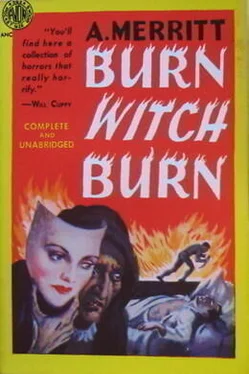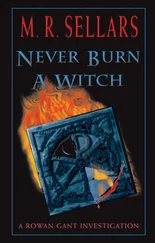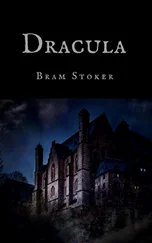"The child was sweet and good as an angel, and she changed into a devil!"
I promised to keep him apprised of any discoveries I might make, and shortly after our conversation I was visited by the young physician who had attended Hortense Darnley. Doctor Y, as I shall call him, had nothing to add to the medical aspect other than what I already knew, but his talk suggested the first practical line of approach toward the problem.
His office, he said, was in the apartment house which had been Hortense Darnley's home. He had been working late, and had been summoned to her apartment about ten o'clock by the woman's maid, a colored girl. He had found the patient lying upon her bed, and had at once been struck by the expression of terror on her face and the extraordinary limpness of her body. He described her as blonde, blue– eyed—"the doll type."
A man was in the apartment. He had at first evaded giving his name, saying that he was merely a friend. At first glance, Dr. Y had thought the woman had been subjected to some violence, but examination revealed no bruises or other injuries. The "friend" had told him they had been eating dinner when "Miss Darnley flopped right down on the floor as though all her bones had gone soft, and we couldn't get anything out of her." The maid confirmed this. There was a half–eaten dinner on the table, and both man and servant declared Hortense had been in the best of spirits. There had been no quarrel. Reluctantly, the "friend" had admitted that the seizure had occurred three hours before, and that they had tried to "bring her about" themselves, calling upon him only when the alternating expressions which I have referred to in the case of Peters began to appear.
As the seizure progressed, the maid had become hysterical with fright and fled. The man was of tougher timber and had remained until the end. He had been much shaken, as had Dr. Y, by the after–death phenomena. Upon the physician declaring that the case was one for the coroner, he had lost his reticence, volunteering his name as James Martin, and expressing himself as eager for a complete autopsy. He was quite frank as to his reasons. The Darnley woman had been his mistress, and he "had enough trouble without her death pinned to me."
There had been a thorough autopsy. No trace of disease or poison had been found. Beyond a slight valvular trouble of the heart, Hortense Darnley had been perfectly healthy. The verdict had been death by heart disease. But Dr. Y was perfectly convinced the heart had nothing to do with it.
It was, of course, quite obvious that Hortense Darnley had died from the same cause or agency as had all the others. But to me the outstanding fact was that her apartment had been within a stone's throw of the address Ricori had given me as that of Peters. Furthermore, Martin was of the same world, if Dr. Y's impressions were correct. Here was conceivably a link between two of the cases—missing in the others. I determined to call in Ricori, to lay all the cards before him, and enlist his aid if possible.
My investigation had consumed about two weeks. During that time I had become well acquainted with Ricori. For one thing he interested me immensely as a product of present–day conditions; for another I liked him, despite his reputation. He was remarkably well read, of a high grade of totally unmoral intelligence, subtle and superstitious—in olden time he would probably have been a Captain of Condottieri, his wits and sword for hire. I wondered what were his antecedents. He had paid me several visits since the death of Peters, and quite plainly my liking was reciprocated. On these visits he was guarded by the tight– lipped man who had watched by the hospital window. This man's name, I learned, was McCann. He was Ricori's most trusted bodyguard, apparently wholly devoted to his white–haired chief. He was an interesting character too, and quite approved of me. He was a drawling Southerner who had been, as he put it, "a cow–nurse down Arizona way, and then got too popular on the Border."
"I'm for you, Doc," he told me. "You're sure good for the boss. Sort of take his mind off business. An' when I come here I can keep my hands outa my pockets. Any time anybody's cutting in on your cattle, let me know. I'll ask for a day off."
Then he remarked casually that he "could ring a quarter with six holes at a hundred–foot range."
I did not know whether this was meant humorously or seriously. At any rate, Ricori never went anywhere without him; and it showed me how much he had thought of Peters that he had left McCann to guard him.
I got in touch with Ricori and asked him to take dinner with Braile and me that night at my house. At seven he arrived, telling his chauffeur to return at ten. We sat at the table with McCann, as usual, on watch in my hall, thrilling, I knew, my two night nurses—I have a small private hospital adjunct—by playing the part of a gunman as conceived by the motion pictures.
Dinner over, I dismissed the butler and came to the point. I told Ricori of my questionnaire, remarking that by it I had unearthed seven cases similar to that of Peters.
"You can dismiss from your mind any idea that Peters' death was due to his connection with you, including the tiny globes of radiance in the blood of Peters."
At that his face grew white. He crossed himself.
"La strega!" he muttered. "The Witch! The Witch–fire!"
"Nonsense, man!" I said. "Forget your damned superstitions. I want help."
"You are scientifically ignorant! There are some things, Dr. Lowell—" he began, hotly; then controlled himself.
"What is it you want me to do?"
"First," I said, "let's go over these eight cases, analyze them. Braile, have you come to any conclusions?"
"Yes," Braile answered. "I think all eight were murdered!"
Chapter III
The Death and Nurse Walters
That Braile had voiced the thought lurking behind my own mind—and without a shred of evidence so far as I could see to support it— irritated me.
"You're a better man than I am, Sherlock Holmes," I said sarcastically. He flushed, but repeated stubbornly:
"They were murdered."
"La strega!" whispered Ricori. I glared at him.
"Quit beating around the bush, Braile. What's your evidence?"
"You were away from Peters almost two hours; I was with him practically from start to finish. As I studied him, I had the feeling that the whole trouble was in the mind—that it was not his body, his nerves, his brain, that refused to function, but his will. Not quite that, either. Put it that his will had ceased to care about the functions of the body—and was centered upon killing it!"
"What you're outlining now is not murder but suicide. Well, it has been done. I've watched a few die because they had lost the will to live—"
"I don't mean that," he interrupted. "That's passive. This was active—"
"Good God, Braile!" I was honestly shocked. "Don't tell me you're suggesting all eight passed from the picture by willing themselves out of it—and one of them only an eleven–year–old child!"
"I didn't say that," he replied. "What I felt was that it was not primarily Peters' own will doing it, but another's will, which had gripped his, had wound itself around, threaded itself through his will. Another's will which he could not, or did not want to resist—at least toward the end."
"La maledetta strega!" muttered Ricori again.
I curbed my irritation and sat considering; after all, I had a wholesome respect for Braile. He was too good a man, too sound, for one to ride roughshod over any idea he might voice.
"Have you any idea as to how these murders, if murders they are, were carried out?" I asked politely.
"Not the slightest," said Braile.
"Let's consider the murder theory. Ricori, you have had more experience in this line than we, so listen carefully and forget your witch," I said, brutally enough. "There are three essential factors to any murder—method, opportunity, motive. Take them in order. First— the method.
Читать дальше










